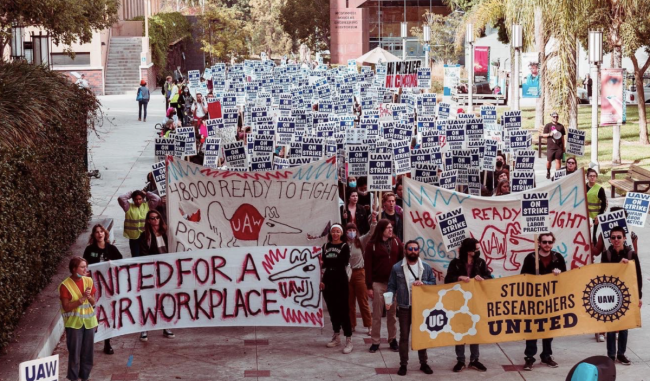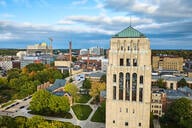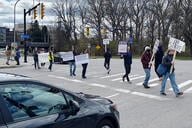You have /5 articles left.
Sign up for a free account or log in.

Academic workers strike at the University of California’s Irvine campus.
UC Student Workers Union UAW 2865/Twitter
Tensions escalated last week between the University of California system and the New School and their respective striking academic workers. As both labor actions entered their fourth weeks, more than two dozen UC workers were arrested at two protests in California, and the New School in New York started withholding pay and benefits from part-time faculty strikers and told student workers to sign work attestations. The New School also floated the idea of hiring replacement graders for the fall term and said it was doing “contingency planning” for the spring.
Then, later in the week, came compromise. The New School, which already had been in mediation with its part-time professors striking for better pay and working conditions, put forth a proposal that was closer to the United Auto Workers–affiliated union’s demands, including annualized status after 10 semesters of term-to-term service. On Saturday night, the university and the union reached a tentative agreement, ending the strike.
“This is a strong, fair, five-year contract that increases compensation significantly, protects health care benefits, and ensures that part-time faculty are paid for additional work done outside the classroom to support our students,” the two parties said in a statement.
The UC system, where four separate groups of UAW-affiliated workers had been on strike, saw the ratification Friday of contract agreements with two groups—postdoctoral scholars and academic researchers, who will return to work—and moved into private mediation with the graduate assistants, readers and tutors who remain on strike seeking stronger contracts. Inflation and housing costs have been key issues.
While the past month has certainly involved ups and downs and hardship for striking workers and their universities, in the middle of the fights on both coasts are undergraduate students. Many of these students’ college experiences already have been impacted by COVID-19, and this new disruption is especially challenging due to the internal nature of the conflict and the lack of clear guidance about how to proceed.
Instruction, where available, has been limited. And when fall grades will be determined, and by whom, have been open questions at both the New School and UC—which is particularly worrisome to students who rely on grade point averages to maintain scholarships and U.S. visa statuses.
Learning at the New School
Classes at the New School were largely canceled throughout the strike, as part-time professors make up 87 percent of the teaching force and full-time professors generally were unwilling to undermine their colleagues by holding classes.
The New School provided all students a voluntary, self-directed assignment involving modules on migration and the environment, among other topics, at the beginning of the strike, though it’s unclear how many student completed it, and it won’t be graded anyway. Striking New School professors and allies organized something called Strike School, featuring scholarly talks on labor and other issues online and on the picket line. But this, too, was voluntary and not part of students’ official coursework.
Cooper Sperling, a second-year student in the New School’s dual-degree program at Eugene Lang College of Liberal Arts and Parsons School of Design, who participated in the strike as part of a student-faculty solidarity group, said that this period was certainly “inconvenient” for students who’d previously navigated pandemic-era high school or college.
“This has been an incredibly difficult time and something that a lot of students have had to persevere through—on one hand, it’s very untraditional,” Sperling said. “But on the other hand, the way we look at it—more so with the strike than with COVID—is that we’re very insistent that we’re learning a lot on the picket line. These are issues that we spend time in the classroom reading about, but we’re actually out there, learning it firsthand. It’s [also] community.”
Colleen Macklin, an associate professor of media design at Parsons who presented at Strike School to support her part-time colleagues and who visited students occupying the University Center last week, agreed that learning didn’t cease entirely during the strike.
“Learning is social. It’s emotional as well as intellectual,” Macklin said. “Messages from the administration have missed this important point, describing learning as something that only happens in the classroom, at designated times, measured by individual progress defined by grades. The students I talked with described learning that is relevant to their lives, intrinsically rewarding, collective and immeasurable. They are learning about life, work and its possibilities in a capitalist system—systems that impact all of us as creative workers and thinkers.”
Other students and New School instructors have expressed similar sentiments on the picket line or on social media, in some cases alleging a disconnect between the New School’s treatment of adjuncts and its stated progressive values. Parents of undergraduates were more outspoken against the prolonged midsemester strike, however. One lawyer even threatened the university with a class action lawsuit brought by parents if classes didn’t resume soon, saying in an email forwarded to news media that, “Since it is the school that has received tuition payments for educational services this semester, it is the school that our clients will be holding accountable.”
One New School parent, who wished to remain anonymous in order to speak freely about her daughter’s experience during the strike and about some of the posts she’s been privy to on university parents’ social media pages, said, “I think the biggest takeaway that I have from that and looking at the parent forums is just mass confusion, with kids being told different things,” and that “trust has been eroded on all ends, on all sides.”
The parent continued, “I just want to say, these are the wrong kids to do this to. These are the pandemic kids, the ones who didn’t have a junior year [in high school] and who, in senior year were on Zoom and trying to get into college. These are the school shooter–era kids who need some sense of stability.”
Regarding end-of-semester grades, the New School faced criticism over an apparently leaked email from a university “talent engagement coordinator” seeking nonexpert “progress reviewer temps” to assess students during the strike. “Progress reviewers will need a sufficient general background in teaching and evaluating in higher education to be able to generally assess student progress toward stated learning outcomes, but they will not be expected to be subject experts in the student’s enrolled courses,” said the email, which has been circulated online.
The New School quickly distanced itself from the memo, saying in a statement that it was “an unfinished and unapproved draft” that shouldn’t have been sent.
Sperling’s student-faculty solidarity group rejected the idea of replacement graders. It also asked that all students receive final A grades, which the university said it couldn’t accommodate. On Friday, the New School sent students a grading update saying that faculty members submitting student grades remained the “best solution,” and that students should begin to prepare self-reflections for each of their courses.
Fall term ends Sunday, Dec. 18.
Learning at the University of California
At the UC, some tenured and tenure-track professors have declined to teach at all during the strike, but many others moved their classes online as to avoid crossing strikers’ physical picket line. UC’s non-tenure-track lecturers generally continued to hold classes, as their recently adopted contract prohibits them from engaging in sympathy strikes. Even where lectures continue, however, discussion sections led by graduate assistants on strike are canceled, cutting off undergraduates from crucial contact time.
Haley Nicole North, an American studies major at UC’s Berkeley campus who is currently finishing her senior honors thesis—and who, like many UC students, is sympathetic to strikers’ demands for a living wage—first transferred to Berkeley in the spring of 2020, weeks ahead of the pandemic hitting. “So my general experience has been not positive, and limited within the parameters of a largely remote education that set me back an entire year,” she said. “This semester I had returned to campus to finish my research, and mid-November the strike began.”
Some of North’s professors are holding classes on Zoom. Classes taught by striking union members have been turned over to departments, however, “and once that happened, the entire system fell apart,” she said. “Most of us are entirely confused, underresourced and desperate for direction. Many undergraduates, like myself, speculate that some of this might be deliberate, as to redirect the frustration at the union members and not at how poorly the university has handled this as a whole.”
North said that the university had significant notice of the possible strike “and chose to do nothing.” Communication from the university also has been “poor,” she said.
Michael Meranze, a professor of history at UCLA who has written about the strike, told Inside Higher Ed, “There is no question that the strike has had a real effect on instruction and thereby on the undergraduates.”
Faculty members, whether they’ve canceled or modified their classes in response to the strike, “have tried to assist undergraduates so that they can continue to learn and have modified assignments to account for the challenges that undergrads face,” continued Meranze, adding that he’d altered his final exam as to not require that students write on material covered during the strike. “I think that others may have done something similar or modified the nature of the final so as to make sure that the undergrads weren’t penalized for the absence of sections.”
With many classes continuing in some way but tutors, readers and graduate assistants still on strike, work to be graded is piling up. The UC’s Academic Senate has offered some guidance on this issue, writing to faculty members, “Because of the current circumstances, including the need to take on evaluating responsibilities that would have otherwise been done by teaching assistants, there may well be unavoidable and understandable delays in grading this term.” While campus registrars have extended grading deadlines, and the hiring of temporary readers is “permissible,” the memo said, professors “should alert their department chair to anticipated difficulties in completing evaluations on time.”
Canceling finals is a vexing issue, the Senate also said, in that, “We must make sure that when we contemplate relaxing our rules under extraordinary circumstances that our best intentions do not have unintentionally harmful consequences. Cancelation of a final exam, for example, may deprive a student of the chance to raise their grade. Making a final exam optional might not.” Standing Academic Senate rules require some type of final exam in all undergraduate courses.
Faculty members already have pledged not to submit some 37,000 final grades until the strike is over. There are generally grades that would have been compiled by student assistants who are on strike, so the pledge is an act of solidarity. But it’s also in many cases a rejection of the idea that professors have the time to pick up this work, especially in large or writing-intensive classes. (Meranze, for example, said, “Faculty have put in enormous amounts of extra work since the beginning of the pandemic, and the university seems to think that they can just add more and more.”)
Anoop Praturu, a graduate assistant in biophysics at the UC’s San Diego campus, said that teaching assistants on strike have been “withholding grades, but the UC has extended the grades deadline, so in some cases they may expect the faculty to complete all of the grading themselves—something which would ultimately compromise the quality of the grading and hurt undergrads in the long run.”
Sky Yang, president of the Associated Students undergraduate student government at UC San Diego and co-chair of a systemwide student government organization, who is studying management and political science, said, “Folks are confused right now, because there is not a lot of guidance given by the university.” Yang said that while registrars have extended grading submission deadlines, it’s unclear when grades will actually be submitted, and that students who need certain grades to stay eligible for financial aid, scholarships or student visa status are planning on asking their professors to input their grades on time.
“Some students are in dire need,” Yang said. “I’m a low-income, first-generation Chinese American college student, so I’m in one of those categories, where I would ask my professor if they can give me a grade because I need letter grades.”
Regarding pass-fail options for students, the Berkeley campus’s Letters and Science Executive Committee approved extending the deadline for this in response to the strike, but such moves have not been uniform across the system.
Beyond questions of grades, Yang said that “without the graduate students, students are suffering in the classrooms. Folks do not have the necessary structure that they could have gotten from the graduate students to be able to learn. In discussion sessions, the TAs break down a professor’s material and teach even more.”
All this means that “the strike is working,” Yang continued, “and that the university should be concerned and negotiate in good faith.” He said the only viable long-term solution to worker compensation issues involves more state investment in higher education, and he urged the university to work toward this goal.
Ryan King, system spokesperson, said in a statement, “We have conducted over 60 bargaining sessions with the union since the spring. During that time, we have secured 95 tentative agreements to date on issues ranging from workplace accessibility, to respectful work environments, to nondiscrimination in employment.”
The university, King said, “appreciates the flexibility and patience of our students and faculty as we navigate the impacts of this strike. We believe that our faculty have both the right and responsibility to determine course and curricular requirements, including those of teaching and research training, for all students. We have full confidence that faculty will continue to meet those responsibilities. We know our faculty wish to avoid any further educational disruptions to graduate students and undergraduate students who have experienced so many disruptions in recent years. We also acknowledge our faculty are facing exceptional challenges in meeting these responsibilities.”
Faculty members “are normatively expected to submit final grades for undergraduate and graduate courses in a timely manner. Several campuses recognizing the burden of doing so under the current circumstances have chosen to extend grading deadlines.”
Union Activity on the Rise
While monthlong academic worker strikes are concerning from a student learning perspective, they are not unprecedented. According to information from National Center for the Study of Collective Bargaining in Higher Education and the Professions at Hunter College of the City University of New York, the graduate assistants’ strike at Columbia University last year lasted 60 days, and a graduate assistants’ strike at Harvard University in 2019 lasted 29 days. Graduate assistants at Indiana University at Bloomington went on strike last spring for four weeks, as well.
Union activity across higher education is increasing, however. Some of the largest filings for union elections with the National Labor Relations Board in 2022 involved graduate worker unions, including those at the Massachusetts Institute of Technology, Yale University, Northwestern University and Johns Hopkins University.
Kate Bronfenbrenner, director of labor education research and a senior lecturer at Cornell University’s School of Industrial and Labor Relations, said that “employers across the economy are feeling the pressure of workers fighting back in a way they haven’t been decades. There’s new union organizing going, new workers getting organized. We have more strikes happening across the economy. We have workers quitting or refusing to return to work for a combination of reasons, because things have deteriorated so much during the pandemic and they also feel like they are more stretched out.”
Regarding strike activity at private colleges and universities, in particular, Bronfenbrenner said that “private-sector universities don’t act that different than any other company, but the difference is that they’re much more vulnerable to consumer pressure. They depend on donations, and donors don’t like the way they’re handling the strikes. If the undergraduate students decide to support the graduate students, or other faculty striking, then the university doesn’t function. Then there’s the general public, who may not feel so comfortable having tax dollars and special zoning privileges for universities who are not paying a decent wage.”





